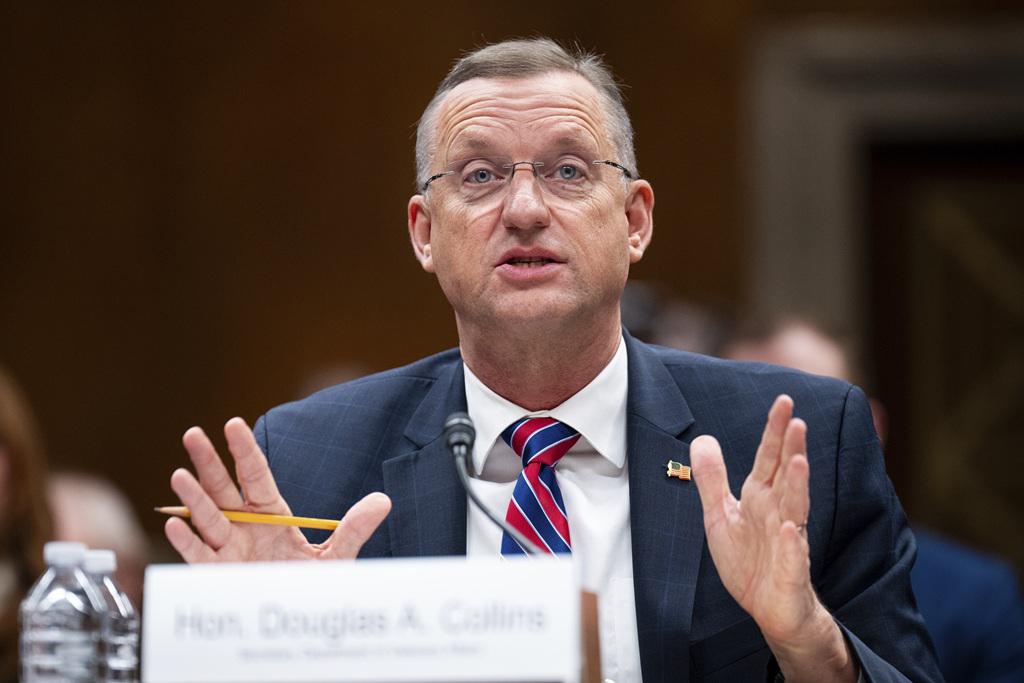Long before becoming secretary of the Department of Veterans Affairs (VA), Doug Collins’s intention to steer veterans and their health care dollars away from VA medical facilities and into private hands was well established. During his tenure in the U.S. House of Representatives, Collins was a staunch ally of the Koch-backed Concerned Veterans for America (CVA), a group whose ideological North Star is privatizing VA services. He embraced three key bills the organization championed that laid the groundwork for outsourcing care for large numbers of VA patients and weakening protections for VA employees.
During his January confirmation hearing, Collins tried his best to shroud his objectives, lulling skeptical committee members with reassuring-sounding platitudes, such as “there’ll always be a VA for the veteran.” He has continued to spread these unconvincing assertions as VA secretary in interviews, press releases, Twitter videos, and congressional hearings, while, at the same time, swiftly advancing proposals to deeply cut VA resources and personnel and redirect the so-called “savings” toward expanded outsourcing to private-sector care.
More from Russell Lemle | Jasper Craven
His approach has become more combative, marked by disparaging comments directed at reporters, VA employees, and officials responsible for overseeing his agenda. During one recent exchange with Sen. Patty Murray (D-WA), Collins lashed out, “You’re not being truthful. I’m not going to let you get away with that.” Yet Collins’s stance calls to mind Shakespeare’s famous observation in Hamlet that “The lady doth protest too much.” It is often the case, after all, that those who most vehemently attack others’ credibility are themselves concealing the truth.
Collins’s privatization campaign rests on four misleading narratives.
First is his pledge that “we’re not cutting VA health care providers.” Collins has repeatedly assured stakeholders that, despite his plan to eliminate between 30,000 and 80,000 department positions this year, the number of providers furnishing direct health care won’t decline one bit.
But the VA’s own internal systems contradict these promises. Normally, when VA staff leave, positions are backfilled to maintain care capacity. Presently, however, countless clinical positions remain unfilled as replacement efforts have slowed to a crawl or stopped entirely. Many facilities have simply removed vacated positions from their organizational charts.
Since the new administration took office in January, the VA has recorded a net loss of thousands of health care positions.
According to the VA’s workforce dashboards, since the new administration took office in January the VA has recorded a net loss of thousands of health care positions, the only net loss in the last five years. The losses include, among others, 688 physicians, 1,882 registered nurses, 365 licensed practical nurses, 316 nurse assistants, 511 social workers, 201 psychologists, and 766 medical support assistants. Just in June 2025 alone, VA health system staffing fell by 2,096. Department-wide job announcements have plummeted by 30 percent and applications by 44 percent since last year, while new employee onboarding has sunk by 52 percent. These figures paint a stark picture of an agency diminishing its capacity to provide direct health care, while pretending that its services remain unchanged.
The upshot of this hemorrhaging was illuminated in a recent hearing when Rep. Mariannette Miller-Meeks (R-IA) crowed that “the higher the ratio between veterans and [VA] staff, the more veterans will need community providers for VA covered specialty care.” In other words, cutting staff has the intended effect of pushing people into the private system.
Second, Collins wrongly portrays private health care as on par with what the VA provides. He has repeatedly asserted that “community care is VA care,” and “we’re going to hold community care to the same high standards as VA.”
The two systems are not the same, however. The Veterans Community Care Program (VCCP) lacks critical features that were pioneered at the VA, including integrated care coordination, comprehensive screenings, rigorous inspector general oversight, and public transparency.
A recent Government Accountability Office report underscores this disparity: Only 2 percent of VCCP mental health providers have completed even one of the eight veteran-specific trainings required for all VA mental health providers. The sharp contrast highlights how distinct the systems truly are. Attempts by Collins and his allies to blur these differences are part of their justification to divert veterans from the VA to private-sector providers.
Relatedly, Collins often states that “the vast majority of our health care can be done just as effectively outside the VA system.” This contention implies that VCCP care quality is comparable to the VA. However, decades of research has established that the VA produces health care outcomes equal or superior to the private sector across virtually every medical condition. A comprehensive summary of peer-reviewed studies published last month reinforces this conclusion. Moreover, a recent survey by Iraq and Afghanistan Veterans of America found that only 31 percent of IAVA members with VCCP experience felt their community providers understand their medical needs.
Finally, Collins claims that “the VA under the Biden administration stifled veterans getting care in the community.” While congressional hearings often spotlight anecdotal cases of veterans struggling to access private-sector care, it’s just not true that Biden’s VA cut off community care. During the first three years of his administration, half a million additional veterans gained access to the VCCP.
These misrepresentations carry serious consequences. Community care unquestionably serves as a vital safety net for rural veterans and those facing extended VA wait times. However, last year’s “Red Team” assessment by independent experts issued a dire warning: The swelling volume of private-sector referrals has created an “existential crisis” for VA health care. Excessive utilization of private providers threatens to close VA units and facilities nationwide, destabilizing the direct care system and undermining its long-term sustainability.
Secretary Collins has not been forthright about the adverse consequences of further expanding private-sector care. Taking concrete steps to counter this trend would ensure that the VA’s integrated system remains fully funded and staffed to meet all the desired health care needs of America’s current and future veterans.

